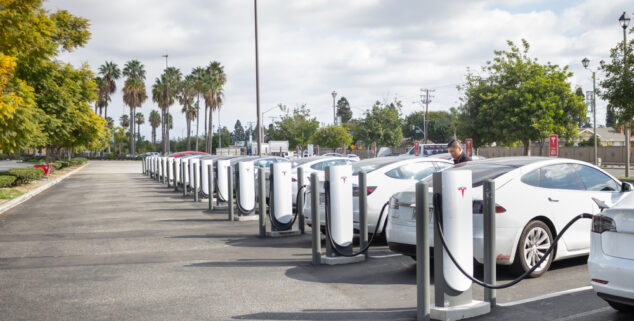News
Prop. 30, an enviro plan to tax the rich, defeated decisively
 A line of vehicles charge up at a Tesla Supercharger station in Westminster. (Photo: The Image Party, via Shutterstock.)
A line of vehicles charge up at a Tesla Supercharger station in Westminster. (Photo: The Image Party, via Shutterstock.)Editor’s Note: UPDATEs with latest returns, edits to conform throughout.
Voters like taxing the rich, as a rule, but Proposition 30, which would take from millionaires and give to electric cars, headed into election night with nearly as much opposition as support – making it appear to be one of the few cliffhangers on the statewide ballot.
But that was short lived: By Wednesday morning, Proposition 30 was soundly rejected by about an 18-point margin, 59.1% to 40.9%, or 3,184,147 votes to 2,206,695. The margin could change in coming days as more votes are counted.
The measure sought to increase the top tax bracket on people earning more than $2 million a year. It would have directed that money to subsidies for zero-emission vehicles and charging stations as well as for fighting wildfires.
It was a divisive initiative that drove a wedge between Democrats and some of their most dependable supporters. The state Democratic Party and a number of labor and environmental groups endorsed the measure, as did a number of prominent officeholders.
Lyft has contributed about $45 million of the $48 million raised to pass the measure.
But the state’s most prominent officeholder, Gov. Gavin Newsom, campaigned against the measure, bucking his own party and taking sides with business groups, anti-tax advocates and the state Republican Party.
Newsom was not alone, however. The highly influential California Teachers Association, a staunch Democratic ally, which in the past has benefited from high-earner tax increases that raised money for education, was in opposition. Business and anti-tax groups also oppose the measure.
Newsom and others called Proposition 30 a “cynical money grab,” by the ride-hailing company Lyft, which has almost single-handedly bankrolled the Yes campaign. Lyft has contributed about $45 million of the $48 million raised to pass the measure.
Opponents said Proposition 30 won’t make much difference to California’s growing fleet of green vehicles. That’s because companies like Lyft – and everybody else for that matter – are heading toward a gas-free future as California phases out the sale of internal combustion engines, so increased sales are inevitable even without a new subsidy.
The most recent polling from the UC Berkeley Institute of Governmental Studies shows the measure with 47 percent support and 41 percent opposition.
Supporters, though, see cleaner air and a dedicated source of revenue to get ZEVs on the road as soon as possible. They said there is nothing in the measure that singles out Lyft for special benefit.
“With Proposition 30, we have the opportunity to reduce air pollution, curb climate change, and build a bold, long-range plan to fund both our acceleration to EVs and firefighting resources,” said Assemblyman Kevin McCarty, a Democrat from Sacramento.
The most recent polling from the UC Berkeley Institute of Governmental Studies shows the measure with 47 percent support and 41 percent opposition. That’s less than the majority needed for passage, but it’s better than it was just a few weeks earlier when support was closer to 41 percent.
The LAO noted that the measure could put pressure on lawmakers to cut other programs in the future.
Proposition 30’s tax hike would have affected people earning more than $2 million a year, raising their current 13.3 percent rate with an additional 1.75 percent. In total, those high earners faced a top bracket of more than 15 percent.
The nonpartisan Legislative Analyst Office estimates that such a tax could raise $3 billion to $4.5 billion annually. The tax would have lasted until 2043, unless ambitious pollution goals are met before then.
The analyst noted that the measure could put pressure on lawmakers to cut other programs in the future. That’s because the added revenue could push the state up against a spending limit approved by voters in 1979. If that measure is reached, Proposition 30 would protect its spending at the expense of other programs.
“As a result, when state spending is at the limit, the proposition would require the state to reduce an equal amount of spending from other programs to ‘make room’ for the new required spending on ZEV programs and wildfire activities,” according to the LAO’s analysis.
If adopted, Proposition 30 would have dedicated about $8 of every $10 raised to zero-emission vehicle subsidies and charging station installation. The remaining $2 is earmarked for fire prevention and response.
Want to see more stories like this? Sign up for The Roundup, the free daily newsletter about California politics from the editors of Capitol Weekly. Stay up to date on the news you need to know.
Sign up below, then look for a confirmation email in your inbox.

Leave a Reply